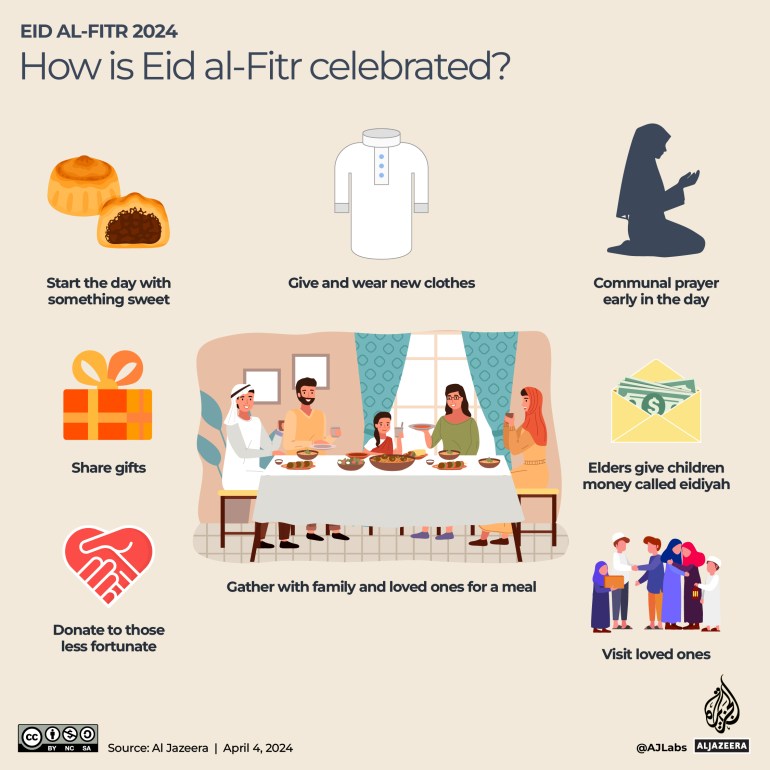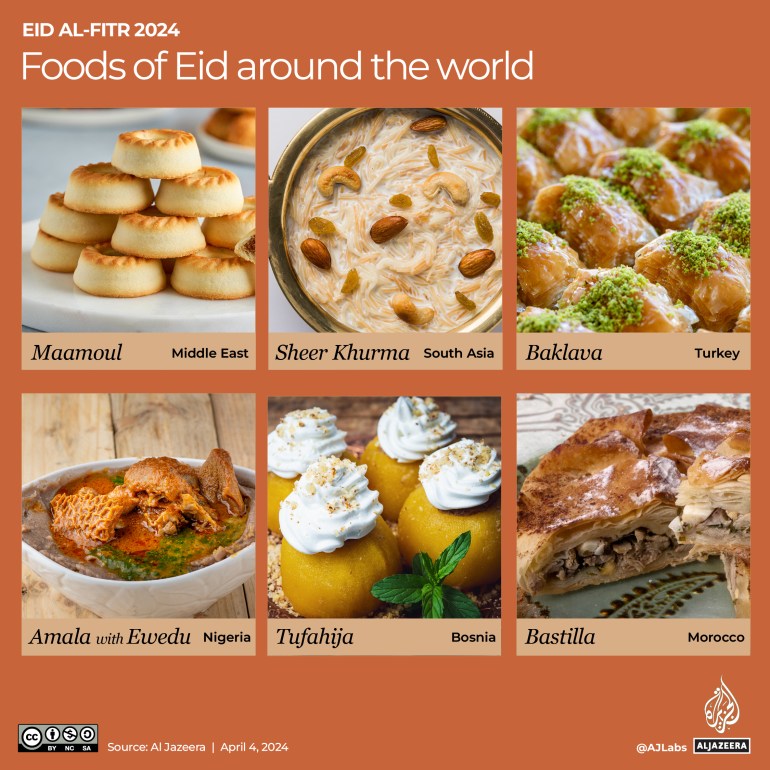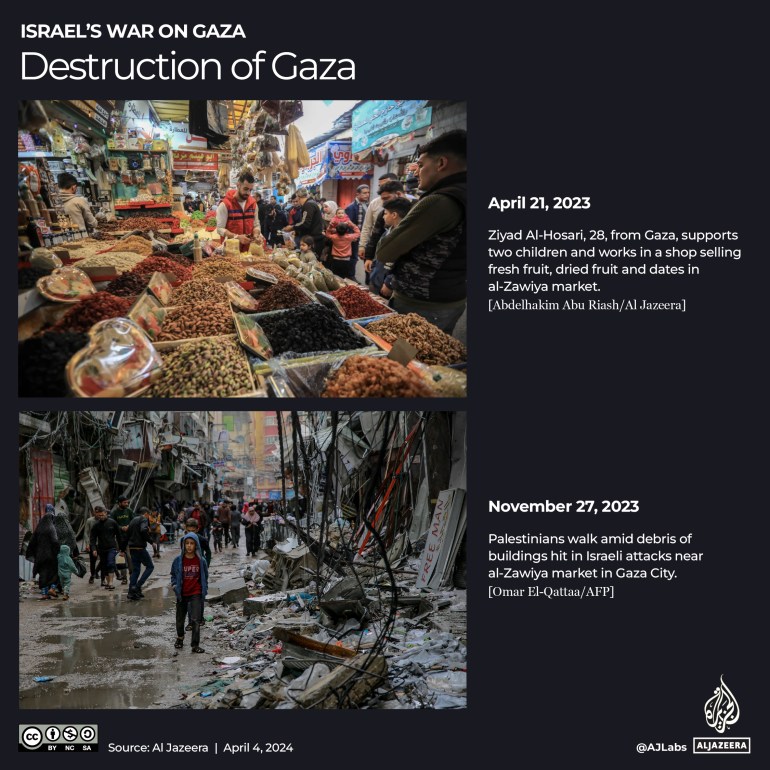EXPLAINER
The three-day festival celebrates the completion of the fasting month of Ramadan by Muslims across the world.
As the fasting month of Ramadan comes to an end, Muslims around the world are preparing for Eid al-Fitr, the “festival of breaking the fast”.
According to astronomical calculations, the month of Ramadan is expected to last 30 days this year, making the first day of Eid in Saudi Arabia and many neighbouring countries likely to be on Wednesday, April 10.
The first day of Eid al-Fitr is determined by the sighting of the crescent moon marking the start of the month of Shawwal, the 10th month of the Islamic (Hijri) calendar.
Lunar months last between 29 and 30 days so Muslims usually have to wait until the night before Eid to verify its date.
After sunset prayers on Monday, April 8, the 29th day of Ramadan, moon sighters will face west with a clear view of the horizon for a first glimpse of the crescent moon. If the new moon is visible, then the next day will be Eid, if not, Muslims will then fast one more day to complete a 30-day month.
Other countries follow independent sightings.
When the sighting has been verified, Eid is declared on television, radio stations and at mosques.
![Muslim worshippers prepare to take part in a morning prayer on the first day of Eid al-Fitr, which marks the end of the holy fasting month of Ramadan, at the Blue Mosque in Istanbul, on April 21, 2023 [Yasin Akgul /AFP]](https://www.aljazeera.com/wp-content/uploads/2024/04/AFP__20230421__33DL38J__v1__HighRes__TurkeyReligionIslamEid-1712214656.jpg?w=770&resize=770%2C524)
How do Muslims celebrate Eid?
Traditionally, Eid is celebrated for three days as an official holiday in Muslim-majority countries. However, the number of holiday days varies by country.
Muslims begin Eid day celebrations by partaking in a prayer service that takes place shortly after dawn, followed by a short sermon.
![Palestinian Muslims perform the morning Eid al-Fitr prayer, marking the end of the holy fasting month of Ramadan in Gaza City on May 2, 2022 [Mahmud HAMS / AFP]](https://www.aljazeera.com/wp-content/uploads/2024/04/AFP__20220502__329C2B2__v1__HighRes__PalestinianIsraelReligionEidGaza-1712214526.jpg?w=770&resize=770%2C514)
On their way to the prayer, which is traditionally held in an open area, Muslims recite takbeerat, praising God by saying “Allahu Akbar”, meaning “God is great”.

It is customary to eat something sweet before the prayer, such as date-filled biscuits known as maamoul in the Middle East. This particular festival is known as the “sweet” Eid – and the distribution of sweets is common across the Muslim world.
Muslims usually spend the day visiting relatives and neighbours and accepting sweets as they move around from house to house.
Each country has traditional desserts and sweets that are prepared before Eid or on the morning of the first day.

Children, dressed in new clothes, are offered gifts and money to celebrate the joyous occasion.
![Children ride a swing on the first day of Eid al-Fitr, which marks the end of the Muslim holy fasting month of Ramadan, in the rebel-held town of Maaret Misrin in Syria's northwestern Idlib province, on April 21, 2023 [Abdulaziz Ketaz / AFP]](https://www.aljazeera.com/wp-content/uploads/2024/04/AFP__20230421__33DM4EH__v2__HighRes__SyriaReligionIslamEid-1712214711.jpg?w=770&resize=770%2C513)
Girls and women in many countries decorate their hands with henna. The celebration for Eid begins the night before as women gather in neighbourhoods and large family gatherings for the application of henna.
![A girl shows her hand decorated with henna at a market area ahead of Eid al-Fitr, which marks the end of the Muslim holy festival of Ramadan, in Srinagar, on April 20, 2023 [Tauseef Mustafa / AFP]](https://www.aljazeera.com/wp-content/uploads/2024/04/AFP__20230420__33DJ2T3__v1__HighRes__IndiaKashmirReligionIslamEid-1712214614.jpg?w=770&resize=770%2C512)
In some countries, families visit graveyards to offer their respects to departed family members right after the morning prayers.
It is common for Muslim-majority countries to decorate their cities with lights and hold festivities to commemorate the end of the fasting month.
![A general view shows the Alif Ki mosque illuminated during the holy month of Ramadan, ahead of Eid al-Fitr, in Ahmedabad on April 19, 2023 [Sam Panthaky/AFP]](https://www.aljazeera.com/wp-content/uploads/2024/04/AFP__20230419__33DH2JB__v1__HighRes__IndiaReligionIslamRamadan-1712214562.jpg?w=770&resize=770%2C513)
Eid amid the onslaught in Gaza
For some 2.3 million Palestinians in Gaza this Eid, this will be the first Muslim religious holiday after more than 33,000 people have been killed in Israeli attacks. With little food aid, and very limited water, Gaza’s Eid al-Fitr will be mired in destruction amid the continuing attacks.

What are common Eid greetings?
The most popular greeting is “Eid Mubarak” (Blessed Eid) or “Eid sa’id” (Happy Eid). Eid greetings also vary depending on the country and language.
The video below shows how people say Eid Mubarak in different languages around the world.









